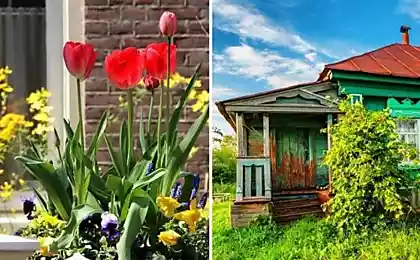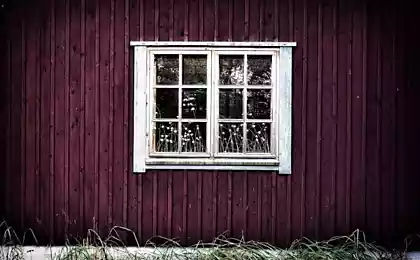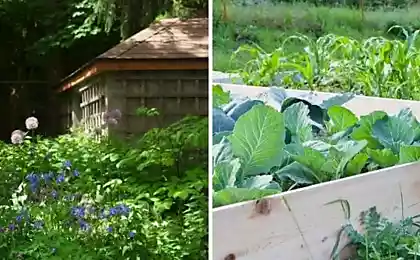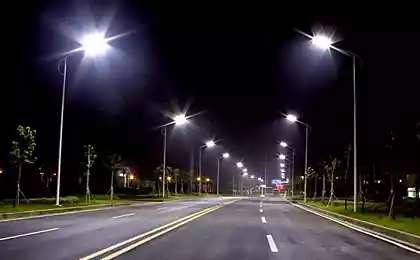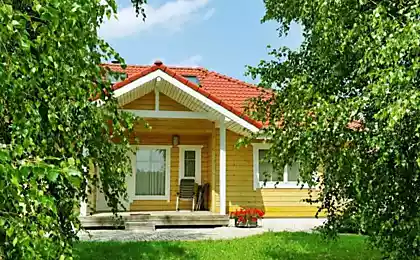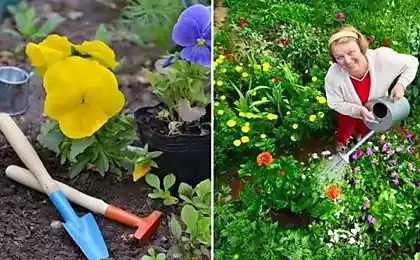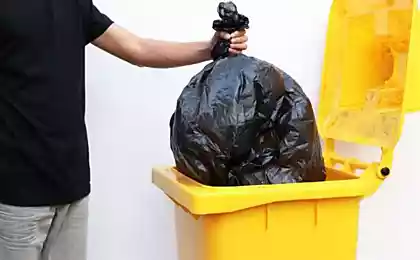206
5 rules how to arrange an environmentally friendly cottage
Install a "dry" toilet
Country "comforts in the yard" is not necessarily a rickety shed, where it is scary to go not only to guests but also to the owners.
Modern toilets are increasingly popular. But in some of them, chemical compounds containing formaldehyde are used to process waste and remove odor, which can not only cause allergies, but also cause great harm to the environment.
Even if in a country house there is a sewer and toilet with a tank, this will not save you from additional water consumption.
The alternative is a dry toilet invented by Finnish engineer Tapio Raita in 1978. Since then, these devices have been successfully used in Finland, and not only in this country.
They not only save water, but also produce compost, which can be safely used to fertilize the soil. A mixture of peat and sawdust is used as filler.
No unpleasant smell in such toilets is not felt - provided that the ventilation pipe is correctly installed, through which carbon dioxide, water vapor and heat are excreted, and oxygen enters the inside.
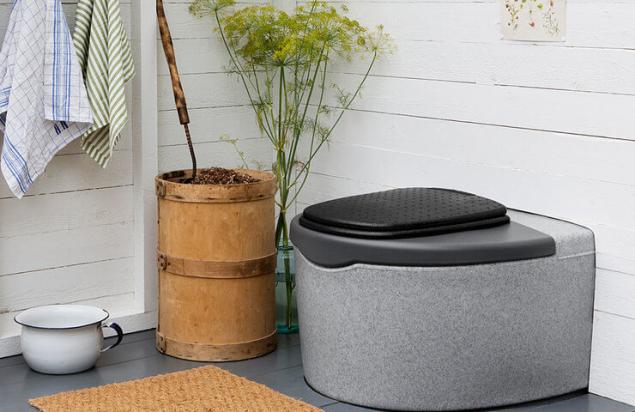
Turn trash into fertilizer
Excellent compost can also be obtained from food waste. The business will go spoiled fruits, vegetables, cereals, tea brewing, coffee grounds. All this must be put in layers in a hole or box.
Sawdust, cut grass, cut branches, even fabric and paper can be disposed of in the same way. The main thing is to periodically stir the pile, providing air flow, and cover the container from above to maintain heat inside. After a few months, the fertilizer will be ready, and it can be distributed on the surface of the beds.
Never try to use leftover meat, fish or pet feces – this will disrupt the composting process!
In addition to compost, other organic fertilizers contribute to increasing soil fertility, for example, wood ash or leaf humus. Vegetables and fruits grown with their use can really be called environmentally friendly, even if you will not achieve record harvests without “chemistry”.
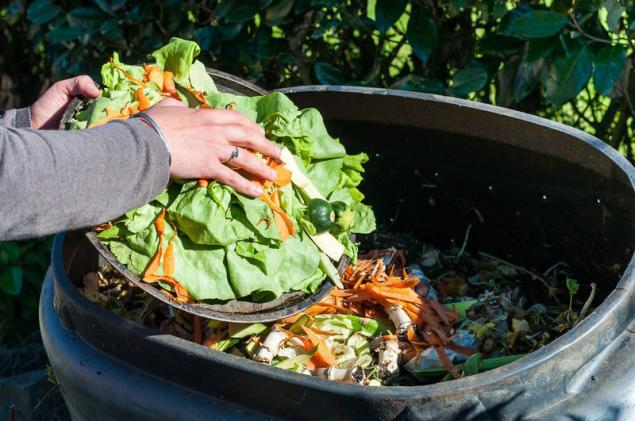
Collect rainwater
Protracted summer showers are not a reason for despondency, it is a chance to stock up on fresh water, which will definitely be useful in the household! And not only for watering plants, but also for washing a car, cleaning and washing - you will not have to spend water from a well or plumbing for these purposes. Unfortunately, rainwater is not suitable for showering or washing dishes without serious filtration, especially if the cottage is located near the metropolis or factories.
One small roof in the middle lane drains up to 2,500 liters per season. To collect this “gift of heaven”, you will need to install a drain and connect it to the reservoir. Warning: Before starting work, check what material the roof is made of. If it contains asbestos (such as slate), copper, lead, then it is better to refuse to collect water.
But clay shingles, PVC and galvanized steel are completely safe. The more storage capacity, the greater the savings, because water will be able to stock up for several months. The tank must necessarily have a filter to protect against foliage and other debris, as well as a hole for draining excess liquid. Some polypropylene containers look like clay jugs or barrels, and can decorate your site.
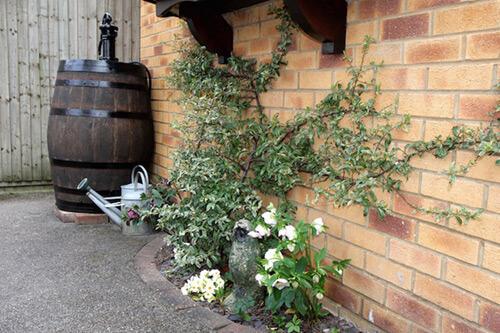
Avoid chemical insecticides
Collecting a Colorado beetle with your hands or spraying a garden and garden with liters of chemical poison – none of these prospects, frankly, please us. And pests do not sleep, threaten the harvest.
There is one more tool tested by our ancestors: planting repellent plants. For example, nasturtia scares away aphids, cabbage caterpillars, whitefly and our favorite Colorado beetle.
Velvets have a similar effect. Ants and apple fertilizer can not tolerate wormwood, earthen flea - mint. And the tan will drive mosquitoes and flies away from your porch. There is no question of getting rid of insects completely, but such neighboring plants will significantly reduce their number.
In addition, you can spray the planting with infusions and decoctions of insecticide plants. Such solutions are less dangerous to humans and animals than chemicals.
For their preparation, tobacco, chamomile, horseradish, onion husk, pepper, marigolds, dandelion, nightshade are used. For example, an infusion of garlic will help in the fight against spider mite and aphids.
Another environmentally friendly insecticide is birds. For them to settle in your garden, you need to create suitable conditions for them. Most of all, they like to make nests on decorative shrubs. Starlings on trees will also provide you with a whole squad of larvae eaters.
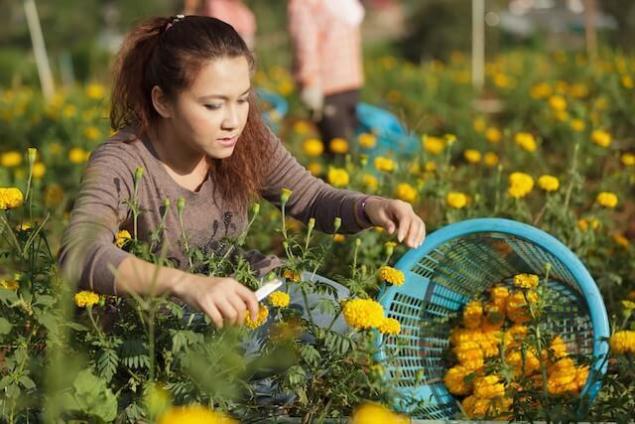
Install "solar" lights
Of course, no one wants to constantly stumble, moving around in the dark. In addition, the illumination allows us to admire the flower beds at any time of the day and creates comfort.
So, do not entangle your entire estate with wires and waste electricity, because solar-powered lamps are now quite affordable. And to install them along the paths or flower beds do not need any tools. During the day, the batteries are charged, and at dusk the lamps automatically turn on.
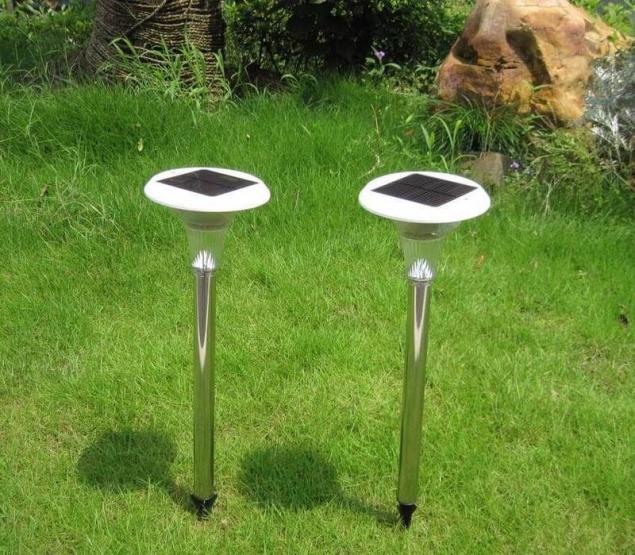
Design can be more than just classic. On sale there are lamps in the form of butterflies, fairy tale heroes or tulips. You can also buy garlands or real street lights that work with the energy of the sun. published
P.S. And remember, just changing our consumption – together we change the world!
Source: profidom.com.ua/stati/doma-i-dachi/12321-5-pravil--kak-obustroit-ekologicheski-chistuju-dachu
Country "comforts in the yard" is not necessarily a rickety shed, where it is scary to go not only to guests but also to the owners.
Modern toilets are increasingly popular. But in some of them, chemical compounds containing formaldehyde are used to process waste and remove odor, which can not only cause allergies, but also cause great harm to the environment.
Even if in a country house there is a sewer and toilet with a tank, this will not save you from additional water consumption.
The alternative is a dry toilet invented by Finnish engineer Tapio Raita in 1978. Since then, these devices have been successfully used in Finland, and not only in this country.
They not only save water, but also produce compost, which can be safely used to fertilize the soil. A mixture of peat and sawdust is used as filler.
No unpleasant smell in such toilets is not felt - provided that the ventilation pipe is correctly installed, through which carbon dioxide, water vapor and heat are excreted, and oxygen enters the inside.

Turn trash into fertilizer
Excellent compost can also be obtained from food waste. The business will go spoiled fruits, vegetables, cereals, tea brewing, coffee grounds. All this must be put in layers in a hole or box.
Sawdust, cut grass, cut branches, even fabric and paper can be disposed of in the same way. The main thing is to periodically stir the pile, providing air flow, and cover the container from above to maintain heat inside. After a few months, the fertilizer will be ready, and it can be distributed on the surface of the beds.
Never try to use leftover meat, fish or pet feces – this will disrupt the composting process!
In addition to compost, other organic fertilizers contribute to increasing soil fertility, for example, wood ash or leaf humus. Vegetables and fruits grown with their use can really be called environmentally friendly, even if you will not achieve record harvests without “chemistry”.

Collect rainwater
Protracted summer showers are not a reason for despondency, it is a chance to stock up on fresh water, which will definitely be useful in the household! And not only for watering plants, but also for washing a car, cleaning and washing - you will not have to spend water from a well or plumbing for these purposes. Unfortunately, rainwater is not suitable for showering or washing dishes without serious filtration, especially if the cottage is located near the metropolis or factories.
One small roof in the middle lane drains up to 2,500 liters per season. To collect this “gift of heaven”, you will need to install a drain and connect it to the reservoir. Warning: Before starting work, check what material the roof is made of. If it contains asbestos (such as slate), copper, lead, then it is better to refuse to collect water.
But clay shingles, PVC and galvanized steel are completely safe. The more storage capacity, the greater the savings, because water will be able to stock up for several months. The tank must necessarily have a filter to protect against foliage and other debris, as well as a hole for draining excess liquid. Some polypropylene containers look like clay jugs or barrels, and can decorate your site.

Avoid chemical insecticides
Collecting a Colorado beetle with your hands or spraying a garden and garden with liters of chemical poison – none of these prospects, frankly, please us. And pests do not sleep, threaten the harvest.
There is one more tool tested by our ancestors: planting repellent plants. For example, nasturtia scares away aphids, cabbage caterpillars, whitefly and our favorite Colorado beetle.
Velvets have a similar effect. Ants and apple fertilizer can not tolerate wormwood, earthen flea - mint. And the tan will drive mosquitoes and flies away from your porch. There is no question of getting rid of insects completely, but such neighboring plants will significantly reduce their number.
In addition, you can spray the planting with infusions and decoctions of insecticide plants. Such solutions are less dangerous to humans and animals than chemicals.
For their preparation, tobacco, chamomile, horseradish, onion husk, pepper, marigolds, dandelion, nightshade are used. For example, an infusion of garlic will help in the fight against spider mite and aphids.
Another environmentally friendly insecticide is birds. For them to settle in your garden, you need to create suitable conditions for them. Most of all, they like to make nests on decorative shrubs. Starlings on trees will also provide you with a whole squad of larvae eaters.

Install "solar" lights
Of course, no one wants to constantly stumble, moving around in the dark. In addition, the illumination allows us to admire the flower beds at any time of the day and creates comfort.
So, do not entangle your entire estate with wires and waste electricity, because solar-powered lamps are now quite affordable. And to install them along the paths or flower beds do not need any tools. During the day, the batteries are charged, and at dusk the lamps automatically turn on.

Design can be more than just classic. On sale there are lamps in the form of butterflies, fairy tale heroes or tulips. You can also buy garlands or real street lights that work with the energy of the sun. published
P.S. And remember, just changing our consumption – together we change the world!
Source: profidom.com.ua/stati/doma-i-dachi/12321-5-pravil--kak-obustroit-ekologicheski-chistuju-dachu
How does the brain: the substantia nigra
Warm floors in wooden house: the peculiarities of installation


